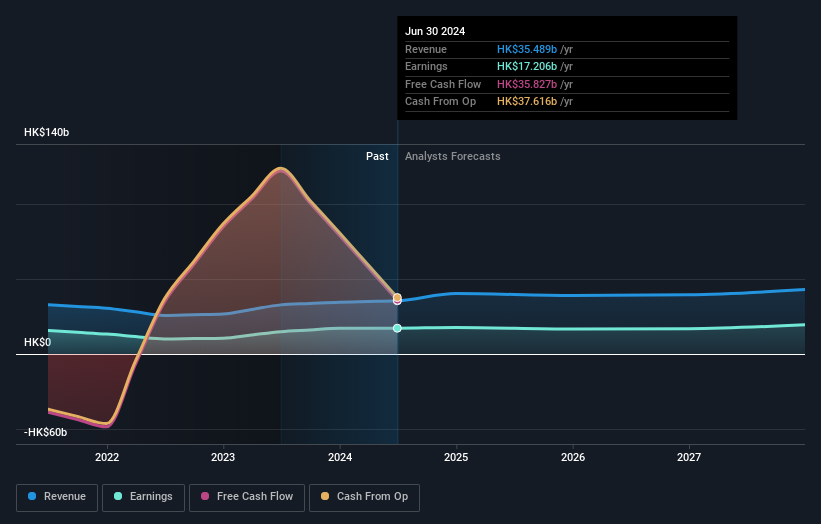
Key Insights
- Hang Seng Bank's significant public companies ownership suggests that the key decisions are influenced by shareholders from the larger public
- 63% of the company is held by a single shareholder (HSBC Holdings plc)
- Using data from analyst forecasts alongside ownership research, one can better assess the future performance of a company
If you want to know who really controls Hang Seng Bank Limited (HKG:11), then you'll have to look at the makeup of its share registry. The group holding the most number of shares in the company, around 63% to be precise, is public companies. In other words, the group stands to gain the most (or lose the most) from their investment into the company.
Meanwhile, individual investors make up 30% of the company’s shareholders.
In the chart below, we zoom in on the different ownership groups of Hang Seng Bank.
View our latest analysis for Hang Seng Bank

What Does The Institutional Ownership Tell Us About Hang Seng Bank?
Institutional investors commonly compare their own returns to the returns of a commonly followed index. So they generally do consider buying larger companies that are included in the relevant benchmark index.
As you can see, institutional investors have a fair amount of stake in Hang Seng Bank. This can indicate that the company has a certain degree of credibility in the investment community. However, it is best to be wary of relying on the supposed validation that comes with institutional investors. They too, get it wrong sometimes. If multiple institutions change their view on a stock at the same time, you could see the share price drop fast. It's therefore worth looking at Hang Seng Bank's earnings history below. Of course, the future is what really matters.

Hang Seng Bank is not owned by hedge funds. The company's largest shareholder is HSBC Holdings plc, with ownership of 63%. This essentially means that they have extensive influence, if not outright control, over the future of the corporation. In comparison, the second and third largest shareholders hold about 1.6% and 1.5% of the stock.
While studying institutional ownership for a company can add value to your research, it is also a good practice to research analyst recommendations to get a deeper understand of a stock's expected performance. There are a reasonable number of analysts covering the stock, so it might be useful to find out their aggregate view on the future.
Insider Ownership Of Hang Seng Bank
The definition of company insiders can be subjective and does vary between jurisdictions. Our data reflects individual insiders, capturing board members at the very least. Company management run the business, but the CEO will answer to the board, even if he or she is a member of it.
Insider ownership is positive when it signals leadership are thinking like the true owners of the company. However, high insider ownership can also give immense power to a small group within the company. This can be negative in some circumstances.
Our data suggests that insiders own under 1% of Hang Seng Bank Limited in their own names. As it is a large company, we'd only expect insiders to own a small percentage of it. But it's worth noting that they own HK$28k worth of shares. It is always good to see at least some insider ownership, but it might be worth checking if those insiders have been selling.
General Public Ownership
With a 30% ownership, the general public, mostly comprising of individual investors, have some degree of sway over Hang Seng Bank. While this size of ownership may not be enough to sway a policy decision in their favour, they can still make a collective impact on company policies.
Public Company Ownership
Public companies currently own 63% of Hang Seng Bank stock. We can't be certain but it is quite possible this is a strategic stake. The businesses may be similar, or work together.
Next Steps:
While it is well worth considering the different groups that own a company, there are other factors that are even more important. Consider risks, for instance. Every company has them, and we've spotted 1 warning sign for Hang Seng Bank you should know about.
If you would prefer discover what analysts are predicting in terms of future growth, do not miss this free report on analyst forecasts.
NB: Figures in this article are calculated using data from the last twelve months, which refer to the 12-month period ending on the last date of the month the financial statement is dated. This may not be consistent with full year annual report figures.
Have feedback on this article? Concerned about the content? Get in touch with us directly. Alternatively, email editorial-team (at) simplywallst.com.
This article by Simply Wall St is general in nature. We provide commentary based on historical data and analyst forecasts only using an unbiased methodology and our articles are not intended to be financial advice. It does not constitute a recommendation to buy or sell any stock, and does not take account of your objectives, or your financial situation. We aim to bring you long-term focused analysis driven by fundamental data. Note that our analysis may not factor in the latest price-sensitive company announcements or qualitative material. Simply Wall St has no position in any stocks mentioned.